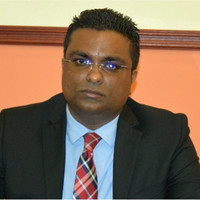When electors go to the polls on March 2, 2020 they will cast their ballots at fewer private residences as the Guyana Elections Commission (GECOM) in response to lobbying from the major political parties has moved 95% of polling places to public buildings such as schools, community centres and churches.
This decision has however been criticized by the opposition People’s Progressive Party/Civic (PPP/C).
“The commission took a decision to remove as far as possible private residences as polling places. What this has resulted in for some areas is a concentration of polling stations in one location for example several stations in one place which is a cause for concern. There is a concern that a larger catchment area having to access one polling place means that persons have to travel further distances to meet that polling station and the number of persons who have to access a polling place to visit the polling stations within there may also cause an issue,” Opposition-nominated Commissioner Sase Gunraj told reporters following yesterday’s statutory meeting of GECOM.
He however acknowledged that both sides of the commission had for years lobbied for just such an action.
“Yes. I do not have a difficulty in the reduction of the use of private residences it is actually something that has been advocated for a very long time at the commission. The use of private residences should be reduced,” he said before cautioning that this reduction should not compromise voter comfort and accessibility.
Chief Election Officer (CEO) Keith Lowenfield had told reporters two weeks ago that the 660,998 persons who appear on the Official List of Electors (OLE) will be voting at 2352 polling stations.
Of that number 131 are to be housed at private residences mostly on the East Coast corridor of Region Four. In fact of the 131 private residences to be used 91 will be in Region 4.
In 2015 the commission approved approximately 150 private residences among the 2,299 polling stations.
Despite these facts members of PPP/C have publicly claimed that a decision by the commission “to only use public buildings as polling stations…will cause confusion, chaos, tremendous hardship and inconvenience on polling day.”
In a Facebook post late Monday evening PPP/C executive Anil Nandlall suggested that the secretariat was facilitating voter suppression.
According to Nandlall some communities which have thousands of voters, only have one or two public buildings, whilst others, have many public buildings.
“This inequitable distribution of polling places is discriminatory in so far as, it gives electorates in certain communities’ easier access to voting places than others. In my view, this amounts to suppression if not a denial of persons’ constitutional right to vote. This strikes at the heart of the democratic process,” he claimed.
Nandlall attempted to justify his position by referencing the community of Mon Repos on the East Coast of Demerara, which he said had 19 polling places in the 2015, for 2020, that has been reduced to two.
“This will cause voters to be in lines for hours. No elector should be subjected to such unnecessary hardships to exercise his or her franchise,” he argued.
This is however unlikely as in cases where there are more than one polling station housed at a single place of poll such as a school there has traditionally been no problem with access or expedient flow.
Each polling station is housed in a different classroom or office, in some cases even on different floors of the same building and each carries its own line.
Gunraj noted that on average each polling station has less than 400 voters with some having as few as 10 voters.
“In some areas one polling station may have 10 people. You may have some places where there are so many persons who have to access one polling station that there may be either an alpha split or a geo split to accommodate that. [However] If you have about 10 polling stations at one polling place you may have about 4,000 persons accessing one polling place over the course of the day and that may be a cause of concern,” he added.
Government-nominated Commiss-ioner Vincent Alexander dismissed this concern and pointed out that the majority of voters in the Sophia area have to access a single place of poll.
“Arguments about one entrance and so on are erroneous arguments because anyone who has been involved in elections will tell you that if you go to Sophia almost all of or half of Sophia votes at one location with one entrance. If you go to a place called back school there is one gate that lots of people have to use. GECOM has to have a standard operation,” he stressed.
He labelled the claim that “only public buildings are being used” as incorrect and mischievous.
He stressed that the fact remains that “if you can’t find a public place you have to use a private residence.”
In selecting a polling place the commission has been sensitive to whether a particular property is related to a political party or activist. Such places are not selected.
Both Commissioners have indicated that in light of the complaints the CEO has committed to reviewing the identified locations and making changes where possible.






